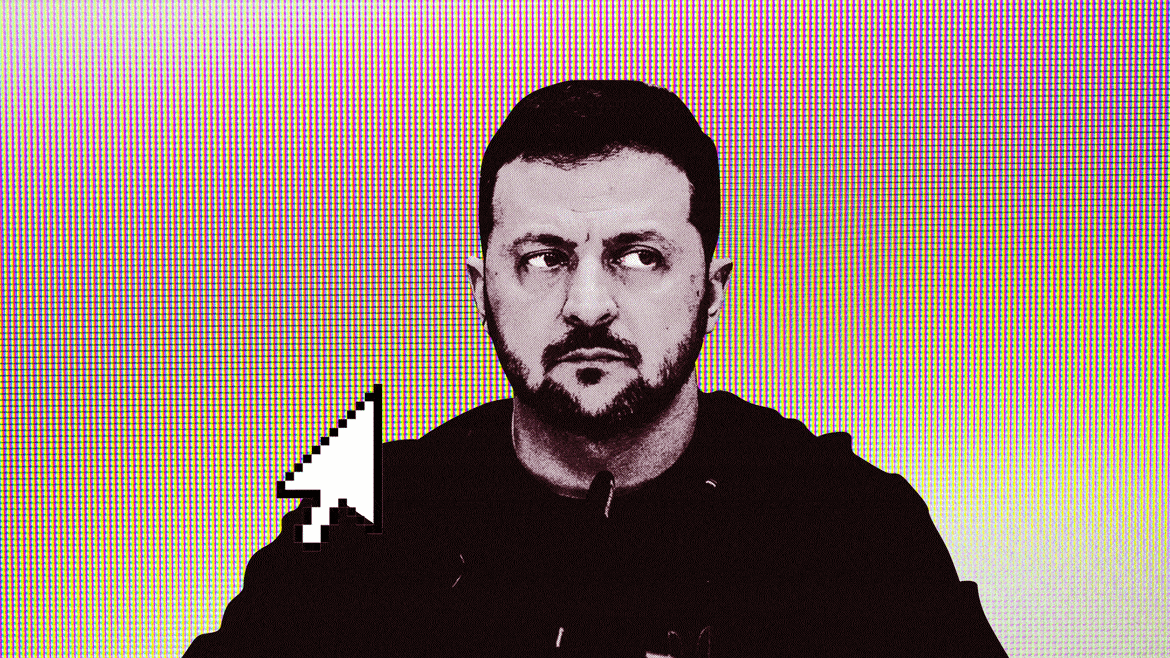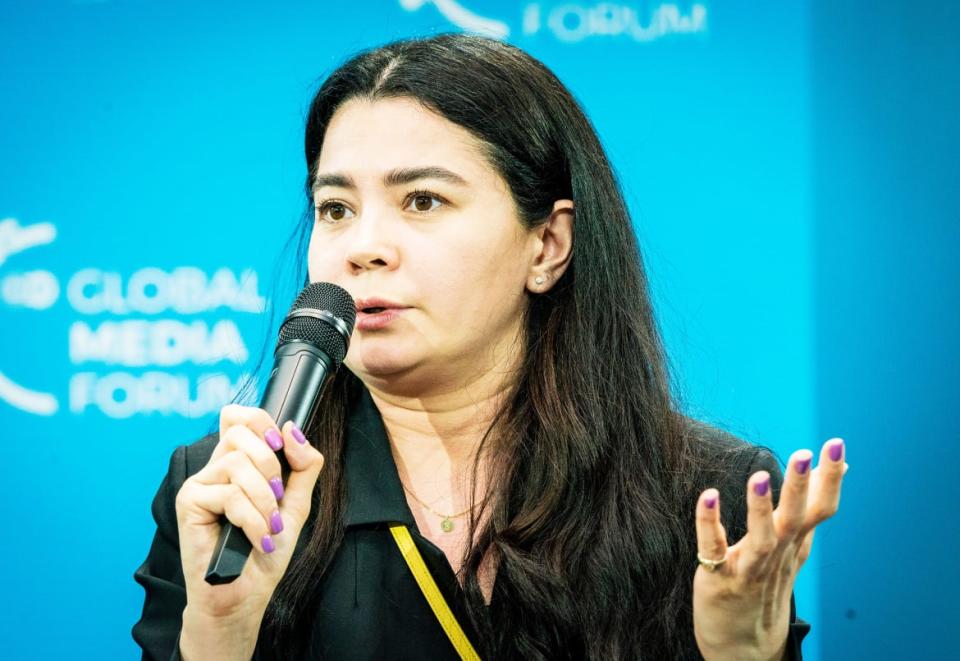Victims Say KGB Tactics Unleashed on Media Because Zelensky Was ‘Offended’

- Oops!Something went wrong.Please try again later.
KYIV—The journalist who broke two of the biggest war-time corruption stories to embarrass President Volodymyr Zelensky’s government has been threatened and abused, and even suffered an attack on his home by hired thugs.
Yuri Nikolov, the editor-in-chief of independent publication Nashi Groshi (Our Money), told The Daily Beast that the so-called police investigation into the intimidation tactics used against him has become “a mockery.” He says he has been warned by law enforcement officials to back off and stop criticizing Zelensky. “It seems the investigators don’t want to follow the threats out of fear that they will discover something big,” he said.
The attack on Nikolov is part of a wider crackdown against the media that began early this year when the independent press reacted negatively to Zelensky’s plans to fire the popular commander-in-chief of the military.
As tensions between the media and the presidential office grew, Ukrainian intel operatives were caught setting up hidden cameras to record off-duty journalists partying. Kompromat footage of reporters taking drugs was posted on social media in a flagrant state-backed effort to undermine their investigative work.
“We have two sources confirming that the crackdown on the press was initiated by our leadership, because President Zelensky feels offended by any criticism,” Sevgil Musaieva, editor-in-chief of the country’s most respected news outlet, Ukrainska Pravda, told The Daily Beast.
Three other editors-in-chief at top Ukrainian publications told The Daily Beast that intense pressure on journalists who dared to criticize Zelensky is continuing and police investigations into the most egregious attacks show no sign of progress.
Musaieva, who runs a team of over 150 reporters across the war-torn country, said it has been made known to her that the presidential office “dislikes” the outlet.
“The pressure began when journalists questioned the president’s decision to fire top commander General Zaluzhny,” she said.
General Valery Zaluzhny had become increasingly outspoken in his blunt assessment of the stalemate with Russia before he was fired. He pointed the finger at the reluctance of Zelensky’s government to authorize wider conscription to bolster his forces, which have been losing ground in recent months.
During the decade of conflict with Russia since the seizure of Crimea in 2014, Musaieva’s colleagues have been captured, assassinated, or gone missing in the field in the name of serving the Ukrainian people. At least four are now serving in the army. But that is not enough to protect them from accusations that they are not sufficiently patriotic.
Terrifying Poison Threat Makes Ukraine Soldiers’ Lives Hell
“Critics affiliated with the government called me ‘cheburek’ [which is an insult based on traditional Crimean meat pies] after our reports on the conflict between President Zelensky and top commander Gen. Zaluzhny; and they were not simple trolls,” she said. “Anonymous Telegram channels affiliated with power continue to insult us, claiming we are funded by Russia—that is a pure lie, an attempt to show that we are ‘enemies of the people.’”

Sevgil Musaieva, editor-in-chief of Ukrainian Newspaper Ukrainska Pravda, talks at the Deutsche Welle Global Media Forum on June 19, 2023 in Germany.
Sevgil Musaieva, the recipient of prestigious International Press Freedom Awards, said Zelensky’s office was making no effort to curb the crackdown even now that some of the attacks have been exposed by the media. “Police investigators still have not told us who ordered the attacks on Ukrainska Pravda, Nashi Groshi, Bihus.Info and multiple other media outlets. And frankly, we are losing hope of seeing any results, since the leadership see no issue—they don’t seem to understand why we are so crucially needed in Ukraine today,” she said.
Kompromat Plot
The most stunning attack on the press was orchestrated by the Security Service of Ukraine (SBU), which many have subsequently suggested ought to have been focused on repelling Russia’s physical and psychological warfare.
Kompromat videos and photos in saunas or bedrooms were a favorite KGB method of discrediting the Kremlin’s critics. Those same tactics were turned on Ukraine’s independent media by the SBU, the successor to Ukraine’s branch of the Soviet-era KGB.
After videos appeared on Telegram showing staff from the investigative site Bihus.info taking drugs and partying at a private new year’s celebration at a hotel, the reporters turned their hands to investigating who had been spying on them.
Denis Bihus, the news outlet’s founder, told The Daily Beast that they discovered that “30 SBU officers launched a surveillance operation.”
Hotel staff told them that the day before their party in January, a group of men arrived and apparently placed secret cameras in all of the rooms. Just before the Bihus investigative report was published, the head of the SBU department involved was fired.
The SBU did not deny they had been behind the surreptitious video collection, which ended up being published online with the caption: “Can you trust their investigations if they are doing them under the influence of drugs?” They argued that the intelligence collection was part of some kind of perfectly innocent anti-drugs operation.
Bihus told The Daily Beast: “They have been spying on us for months—in short, the leadership is fed up with us, since we publish one or two journalistic investigations into the work of the presidential office every month.”
Suspicious characters were photographed outside the Bihus.Info office weeks later, and the staff have come to accept that they are still being spied on. “We cannot protect our reporters against the Security Service of Ukraine; and frankly, the inspection of our newsroom for bugs is expensive,” Bilhus said. “We have conducted it once.”
President Zelensky was asked who ordered the security services to spy on Bihus.Info reporters at a press conference last month. He responded that the head of the department “has been fired; I don’t want to get involved in that, that’s something law enforcement officials are looking into.”
When The Daily Beast asked Bilhus whether there was any news of progress in that investigation into the mastermind of the spying operation, he just smiled and said, “Progress? At the State Bureau of Investigations?”
The media association of Ukraine condemned the attacks on independent reporters in a January statement about “systematic pressure,” provocations, smear campaigns, as well as violations of journalists’ privacy and even illegal surveillance. Zelensky condemned the pressure and promised an investigation, but months have passed by and there’s no sign of any updates. The Daily Beast requested a comment on the investigation from the presidential office but did not hear back.
Attack at Home
The attacks on Nikolov began with smears and slurs online but that escalated in January to a raid on his home. “I told the police that anonymous Telegram channels had been writing threats to me,” he said.
Nikolov, the editor-in-chief of Nashi Groshi, became famous for breaking two of the biggest corruption stories in Ukraine during the war—questioning the integrity of military procurement. After the threats, a group of men appeared at his apartment in January. “They were shouting insults, threats and my name, so my mother—who is recovering from cancer—immediately realized they were some thugs,” Nikolov told The Daily Beast. She did not open the door.
Remarkably, law enforcement officials tracked down the alleged attackers. “The investigators interrogated the suspects, checked their cell phones and discovered messages from those who had ordered the attack on me and promised $400 and $1000 for the job," he said. “But it seems the investigators don’t want to follow the threats out of fear that they will discover something big.”
Nikolov most recently met with the law enforcement officials last week. “Originally, they opened a case against the attack on me on the criminal law #171—impeding the lawful professional activity of journalists—but now the investigator said the attack was mere hooliganism, he also tells me I should not be criticizing the president.”
Some attacks on reporters are more sophisticated than others. Natalie Sedletska, editor-in-chief of the investigative TV program Schemes, told The Daily Beast that her reporters had come under different types of pressure. “Our reporter investigated violations by judges, so one of the judges opened a case against the author on accusations of interference in the judicial system. As soon as we raised awareness of the pressure on the journalist, the case was closed,” she said.
In another instance she said a reporter’s Telegram was hacked by someone who was able to grab the two-step verification code from their phone. “Only the Security Service of Ukraine would have such access,” she said.
Sedletska, who is also Kyiv bureau chief for Radio Liberty, said her team was “outraged” at the attempts to break into the reporter's private correspondence. “I am worried about freedom of speech in Ukraine,” she said. “Mainly because our leadership still has not figured out how to make independent journalists partners—they see us as a threat to their stability in power.”
Who Do You Trust?
The chairman of the parliamentary Freedom of Speech Committee, Yaroslav Yurchyshyn, is not worried about pro-Zelensky Telegram channels attempting to discredit independent journalists with kompromat or slurs and accusations that they are being bankrolled by the Russians. “Ukrainian society trusts the independent media more than the authorities,” he said. According to last year’s polls public trust for Ukrainian media was very high, 49 percent. “Independent journalists have a right to investigate any violations of public servant, even if they are committed by the president or his closest team members,” he said. “Our society has a great respect for investigative reporters such as Yuriy Nikolov… they are like famous brands, they can always rely on support from the public.”
According to Yurchyshyn, there was always a department at the SBU watching over the media. “Our special services have the same KGB roots as the Russian FSB,” he said.
Conditions for freedom of speech were even worse under previous presidents Leonid Kuchma and Victor Yanukovych, when reporters were physically attacked and even assassinated over their work—that is not happening under President Zelensky.
Yurchyshyn said that over 30 journalists have been killed in the field while covering the war and more than two dozen have been captured by Russia.
International organizations including the U.S. Agency for International Development (USAID) has been supporting independent media in Ukraine with grants and at least a dozen independent outlets continue to work in Kyiv.
Nataliya Gumenyuk, co-founder of the Reckoning Project, which is documenting Russian war crimes, told The Daily Beast that there was a mixed attitude to the media from Ukrainian officials. “Our military has understood how important journalism is during the war but as for our presidential office, not everybody understands it,” she said. “Authorities don’t like the most important investigations into state corruption. But they should not behave like children. They should be responsible and protect our constitutional rights; show us the results of the investigation; who and why ordered the surveillance on Bihus.info?”
She said the stories about pressure on the independent media had a big resonance in Ukrainian society. “It is funny that a hotel manager gives an interview to journalists investigating surveillance on themselves in their room—this is Ukraine for you. Our country is transparent, there is a big public dialogue between power and civil society. Right now, the SBU spying on reporters is a joke to everybody, the entire country is laughing at them.”
Get the Daily Beast's biggest scoops and scandals delivered right to your inbox. Sign up now.
Stay informed and gain unlimited access to the Daily Beast's unmatched reporting. Subscribe now.

